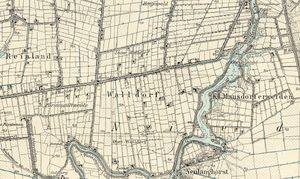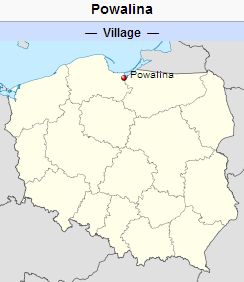Walldorf (Pomeranian Voivodeship, Poland)

Source: Archiwum Map Zachodniej Polski.
Walldorf (now known as Powalina; coordinates: 54.213, 19.188 [54° 12′ 46″ N, 19° 11′ 16″ E]; population in 1905, 189; in 2012, 160) is located approximately 6 kilometres (4 miles) east of Nowy Dwór Gdański (Tiegenhof), 14 km (8.5 mi.) north-west of Elbląg (Elbing), 22 km (14 mi.) north-east of Malbork (Marienburg), and 41 km (25 mi.) south-east of the regional capital Gdańsk (Danzig). It was situated east of Fürstenauerweide, south-east of Reinland, west of Klein Mausdorferweiden, and north-west of Neulanghorst. Unter-Walldorf was located immediately to the north of Walldorf, while Ober-Walldorf was immediately to the south.
The village was established after the Nowomiejski forest had been cleared in ca. 1715. The village was located on both sides of the Nowy Dwór - Marzęcin route and was called Schwartze Tam and Winter Bahn. Until 1772 Walldorf was part of the Kingdom of Poland. The First Partition of Poland in 1772 resulted in the creation of a new province in 1773, called West Prussia, in which Walldorf was located. Walldorf was situated in the district (Kreis) of Elbing until the establishment of the Free City of Danzig in 1920. The village came under the control of Nazi Germany during World War II until February 1945, when it was occupied by Soviet forces and returned to Poland. Today Walldorf (now Powalina) is a village in the administrative district of Gmina Nowy Dwór Gdański, within Nowy Dwór Gdański County, Pomeranian Voivodeship.
The following Mennonite names were mentioned in 1727: Albrecht, Gelbrandt, Kamcke, Lewens, Rowner, Sowatzky, Stahl, Tews, Wieb, Wiens, and Zimmermann. The Prussian census of 1776 lists 38 Mennonite families in Walldorf with the following surnames: Bargin, Braun, Claasen, Dick, Epp, Fast, Hamm, Harder, Heyd, Hiebert, Isaac, Klein, Lipp, Loewen, Martens, Reimer, Rempel, Rideger, Rielen, Sawatzki, Thiesen, Toews, Wiebe, and Wiens. In 1820, the village had 130 residents, including 127 Mennonites. In 1885, the village had 341 hectares, 40 houses, 223 Lutherans and Catholics, and 117 Mennonites.
The Flemish Mennonites who were residents of Walldorf, by far the majority of the Mennonites in the village, were members of the Rosenort Mennonite Church. The small group of Frisian Mennonites in Walldorf were members of the Orlofferfelde Mennonite Church.
Bibliography
Stowarzyszenie Konserwatorów Zabytków. "Powalina." Catalogue of Monuments of Dutch Colonization in Poland. 2005. Web. 22 November 2012. http://holland.org.pl/art.php?kat=obiekt&id=420&lang=en.
Wikipedia. "Powalina." Web. 22 November 2012. http://en.wikipedia.org/wiki/Powalina.
Wolf, Hans-Jürgen. "Familienforschung in Westpreußen." Web. 22 November 2012. http://www.westpreussen.de/pages/forschungshilfen/ortsverzeichnis/details.php?ID=6779.
Maps
Map:Powalina, Pomeranian Voivodeship, Poland
| Author(s) | Richard D Thiessen |
|---|---|
| Date Published | November 2012 |
Cite This Article
MLA style
Thiessen, Richard D. "Walldorf (Pomeranian Voivodeship, Poland)." Global Anabaptist Mennonite Encyclopedia Online. November 2012. Web. 21 Nov 2024. https://gameo.org/index.php?title=Walldorf_(Pomeranian_Voivodeship,_Poland)&oldid=168713.
APA style
Thiessen, Richard D. (November 2012). Walldorf (Pomeranian Voivodeship, Poland). Global Anabaptist Mennonite Encyclopedia Online. Retrieved 21 November 2024, from https://gameo.org/index.php?title=Walldorf_(Pomeranian_Voivodeship,_Poland)&oldid=168713.
©1996-2024 by the Global Anabaptist Mennonite Encyclopedia Online. All rights reserved.
